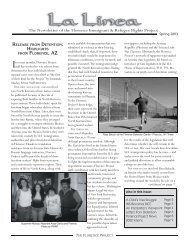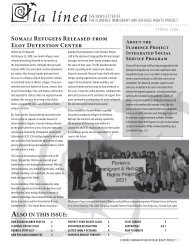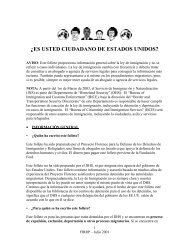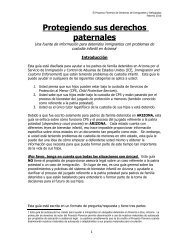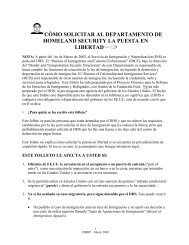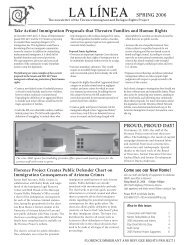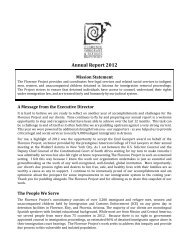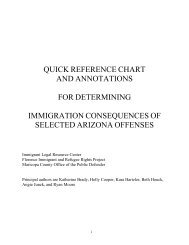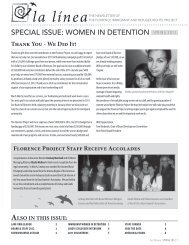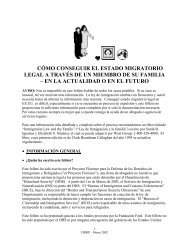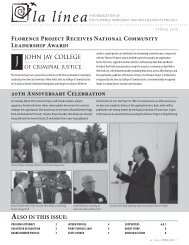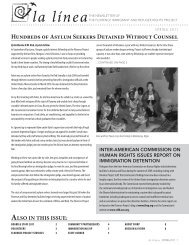HOW TO APPLY FOR ASYLUM - The Florence Project
HOW TO APPLY FOR ASYLUM - The Florence Project
HOW TO APPLY FOR ASYLUM - The Florence Project
Create successful ePaper yourself
Turn your PDF publications into a flip-book with our unique Google optimized e-Paper software.
If there is evidence that will help the judge understand why you committed the crime or why the crime<br />
was less serious than it may appear, you should give it to the judge and DHS. For example, if you were<br />
suffering from emotional problems when you committed the crime and you have seen a doctor or counselor<br />
for this problem, you should get a letter from that person to give to the judge explaining your condition. If<br />
there are papers about the crime that will tend to show that you are not dangerous, such as a letter from your<br />
criminal lawyer or from someone who was there when you committed your crime, give them to the judge and<br />
DHS. But get and file these papers as soon as you can, because the judge might make this decision early on in<br />
your case before hearing about the reasons you are afraid to return to your country.<br />
If you lose your case because the judge decided your crime was a particularly serious one, and if you disagree<br />
with this decision and want to appeal, you can say in your appeal that the judge made a mistake in deciding that<br />
your crime was particularly serious, and you can explain why. We discuss appeals toward the end of this<br />
booklet.<br />
• What if I am denied asylum or withholding of removal because of my crime or crimes, but I have<br />
good reason to fear torture by my government<br />
As we said before, if you are afraid that your government or a government official will torture you,<br />
you may be able to avoid being removed by applying for withholding of removal protection under<br />
Article 3 of the United Nations Convention Against Torture (CAT). This may be true even if you<br />
have a serious criminal conviction. We discuss this form of protection in more detail below.<br />
• What is the rule for someone who has persecuted someone else<br />
If you participated in the persecution of someone because of that person's political opinion, particular social<br />
group, race, nationality, or religion you do not qualify for asylum or withholding of removal. This is true even if<br />
you were acting under orders of your superior. However, fighting in battles against other soldiers or guerrillas is<br />
not persecution.<br />
• Can the judge deny me asylum or withholding of removal for other crimes or acts<br />
If you have criminal convictions, as we mentioned before, you are not eligible to receive asylum or withholding<br />
of removal if the judge decides that your crimes are: “particularly serious;” that you participated in the<br />
persecution of others because of one of the five protected grounds; that you committed a serious crime outside<br />
of the U.S. that was not a political crime; or that you are considered a terrorist or a danger to the security of the<br />
United States. Additionally, if you participated in genocide, torture, or extra-judicial killings, you are also not<br />
eligible for withholding. Because asylum is a discretionary form of relief, if the judge decides your crimes are<br />
not “particularly serious,” he or she can still take your crimes into account when deciding whether you deserve<br />
asylum. <strong>The</strong> judge can also consider other negative things about you, like if you used false papers to get into the<br />
country or to work. But the judge also has to take into account other things, such as the danger you would face<br />
in your country if removed, your health, your age, and your family ties in the United States.<br />
As for withholding of removal under INA section 241(b)(3), if you:<br />
• did not commit a “particularly serious crime”;<br />
• did not participate in the persecution of others because of one of the five protected grounds;<br />
• did not commit a serious crime outside of the U.S. that was not a political crime;<br />
Page 14 of 49<br />
FIRRP- last update June 2007



